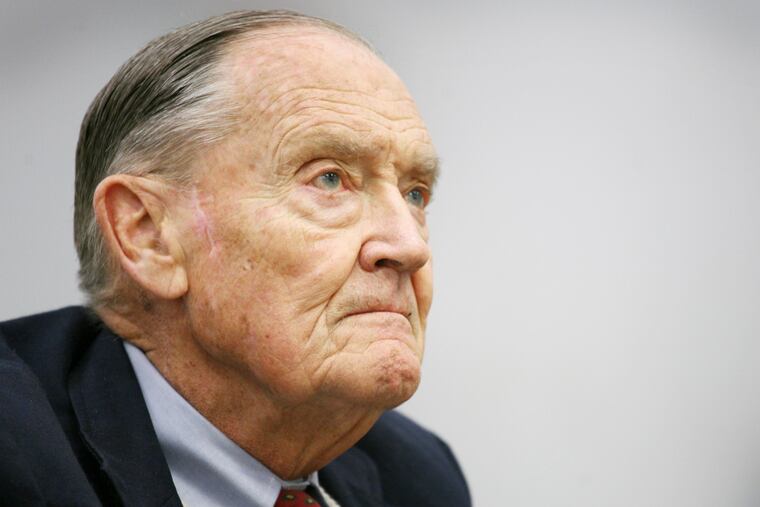ESOP fables: M&T’s Wilmington Trust pays $80 million to settle U.S. price complaints; ‘Friends of Jack’ on Bogle legacy
The bank says it didn’t do anything wrong but is paying $80 million to stay out of court,

Wilmington Trust N.A., a unit of M&T Bancorp, has agreed to pay $80 million to settle federal accusations the company overcharged workers at 21 U.S. companies from 2010 to 2017 when they bought Employee Stock Ownership Plan (ESOP) shares from their employers.
ESOPs are a favorite way for small manufacturers and midsize professional firms to buy out founders and share ownership among managers and workers, who will then be their own bosses.
W.L. Gore & Co. and Wawa Inc. are among the largest Philadelphia-area companies with ESOPs. Wawa remains under the control of the founding Wood family, while Gore, the Newark, Del.-based developer of breathable Gore-Tex fabrics, is majority staff-owned.
The Wilmington Trust case settles complaints the Trump administration brought against the bank for too readily accepting the overly expensive prices that owners and their paid advisers wanted employees to pay for their shares — instead of investigating and seeking independent valuations, as the Labor Department says professional advisers must.
The company didn’t admit any wrongdoing in the settlement. In a statement, it said it was glad to settle the claims and avoid a court fight, and repeated that it hadn’t broken any laws.
In an unrelated case, Wilmington Trust’s former president, Robert Harra, and three top aides were sentenced to federal prison terms in 2018 for lying to the government and investors about loan losses. But they remain free as the Third Circuit federal appeals court in Philadelphia weighs challenges to their convictions.
Bank lobbyists have complained that the government has not posted clear ESOP rules and is instead using lawsuits to set investment policy.
But the Labor Department’s Employee Benefits Security Administration said the bank, with its long experience as a trustee and fiduciary for corporate America, should have worked harder to set a more affordable price for the 3,000 worker-owners at the affected firms who bought out bosses from 2010 to 2017.
The agreement resolves Labor Department lawsuits for ESOP members against Wilmington Trust for its pricing of ESOP shares at Graphite Sales Inc. of Ohio, and HCMC Legal Inc. and Stargate Apparel Inc. of New York.
Other ESOPs in the settlement, which were also investigated by the Labor Department, were concentrated mostly in Ohio, Florida, and New York.
These ESOPs’ members will split the $80 million. Plus the bank has to pay legal costs of $8 million and additional investigative costs.
At Stargate Apparel, Wilmington Trust “hired a conflicted appraisal firm" to value shares for ESOP members to buy — after the firm had already been paid by the sellers to estimate the shares’ value.
The bank also accepted “unaudited financial statements” that showed a suspicious sudden increase in Stargate profits leading up to the sale without investigating obvious “red flags.”
The bank is no longer in the ESOP members’ advisory business. It set aside the money last year to pay the settlements, according to its 2019 annual report.
Bogle’s legacy
The late John C. “Jack” Bogle, the genial, tireless promoter of low-fee index funds who founded what’s now the $6 trillion asset Vanguard Group, would be 91 this week. And a group calling itself the Friends of Jack is assembling online Tuesday to discuss his legacy now that Bogle’s once-revisionist principles have become investor orthodoxy.
"This is perhaps the first such public discussion since his passing” in January 2019, says Knut Rostad, an organizer and head of the Institute for the Fiduciary Standard.
Bogle was best known as the face of Malvern-based Vanguard. Though he was retired from the company longer than he headed it, his 12 books and many public appearances relentlessly pushed Vanguard-style passive investments.
But Vanguard doesn’t dominate the Friends of Jack: They include Ted Aronson, boss of quantitative investor AJO Partners, a man who’s so Philly, he started his career at Michael Milken’s Drexel Lambert when it was still based here, and hired future Comcast CEO Brian Roberts as his intern; New York investment firm head Steven Galbraith of Kindred Capital; Princeton economist Alan Blinder and Princeton endowment investments chief Andy Golden; MIT finance prof Andrew Lo; and Mike Nolan, who handled queries for Bogle as his longtime assistant.
At the Tuesday afternoon program, they will hear pioneering personal finance columnist Jane Bryant Quinn tell how Bogle “changed my life," and from a panel including investor Rick Ferri who edited the “Bogleheads’ Guide to Retirement Planning” and is active on the Bogleheads online investor boards.
Rostad also plans to post the results of a survey that the Friends commissioned, which he says places Bogle a little ahead of Warren Buffett and Bill Gates among respected U.S. business leaders, and further ahead of Steve Jobs, Chuck Schwab, Michael Bloomberg, and Mark Zuckerberg of Facebook.
He also said the firm that Bogle headed won higher recognition and positive marks than Schwab or Merrill Lynch. It does, after all, have more customers.